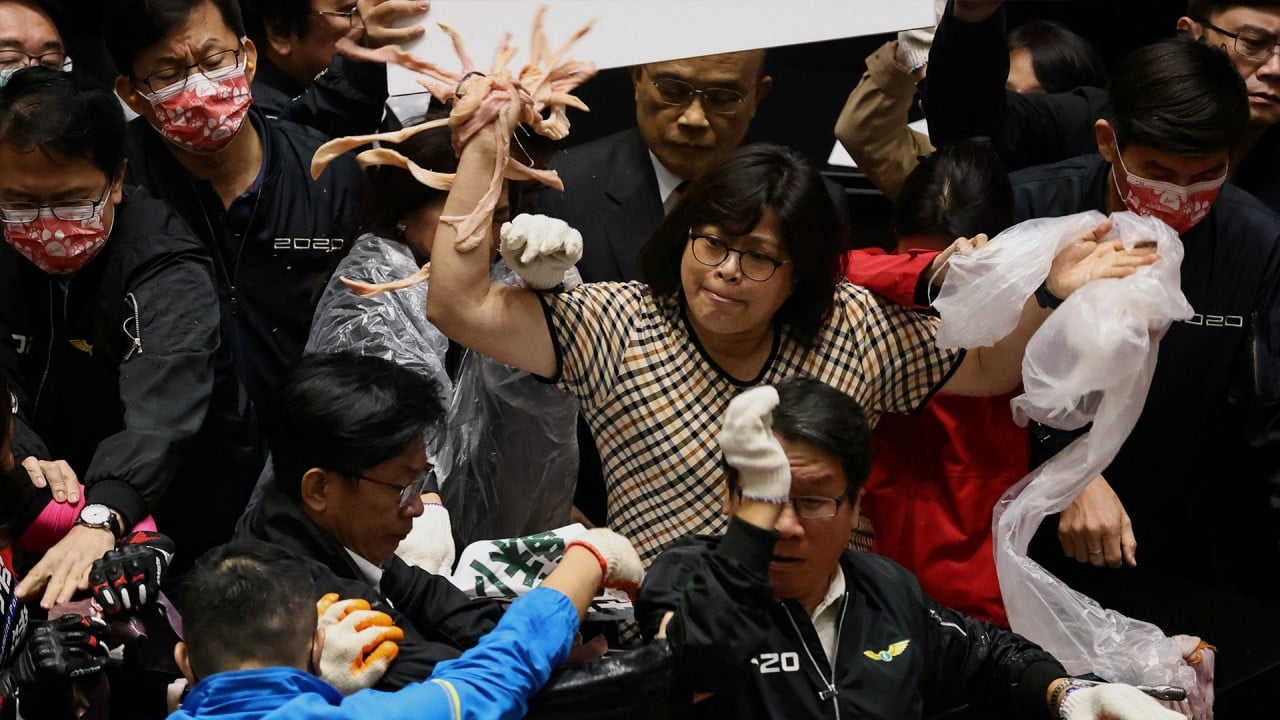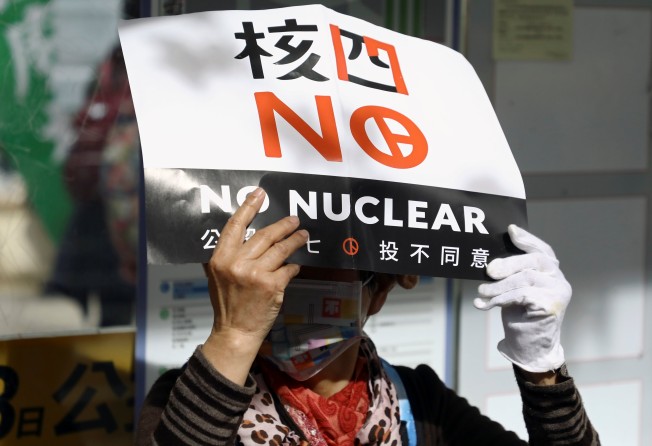
02:04
Pig guts fly in Taiwan parliament protest over easing of restrictions on US pork imports

Going by her Forbes magazine profile, Taiwanese President Tsai Ing-wen has had a good year.
She is number 9 on its list of the world’s most powerful women, her leadership through the coronavirus pandemic “is seen as a global model” and she has “vowed to make Taiwan an indispensable member of the world”.
But Tsai is struggling to be as convincing at home with a big question mark hanging over the fate of her Democratic Progressive Party’s push to veto four proposals to be put to the public in a referendum this Saturday.
Tsai has had a hard time convincing the electorate not to vote in favour of the proposals, with the results being seen as a test of public confidence in her and her government.
The four proposals are as varied as they are contentious.
The first, put forward by two civic groups, is whether Taiwan should reactivate its unfinished fourth nuclear power plant to overcome electricity shortages on the island.
The shortages have resulted in periodic blackouts in recent years which backers of the proposal say have not only affected the daily life of the public but have also threatened industrial production, including the output of big chip companies.
The Tsai government maintains that not only is there nowhere to dump the nuclear waste on the island, it is also highly risky to restart the long-mothballed nuclear power plant, especially when it is located in an earthquake zone.
The second question calls for the protection of an algal reef in Taoyuan where the Tsai government wants to build a liquefied natural gas terminal – a facility that could harm various aquatic wildlife including some endangered species. The Tsai government says the LNG terminal is necessary to ensure power supply but others accuse the president of breaking her previous campaign promise on environmental protection.
Voters will also be asked whether to reinstate a ban on imports of US pork treated with the additive ractopamine. Tsai lifted the ban in January, citing requests from the United States and the need to remove trade restrictions to qualify for membership of regional trade blocs. The opposition Kuomintang has urged the ban to be reinstated on food safety and public health grounds.
The electorate will also decide whether future referendums should be held at the same time as public office elections. The KMT says the move would cut costs, while the Tsai government says it would lead to confusion.
Nearly 20 million Taiwanese are eligible to vote in the upcoming referendums. Under Taiwanese law, a referendum succeeds with a simple majority of at least a quarter of eligible voters. The proposals will need to have at least 5 million valid votes to be adopted.
To drive home their points and to get out the vote, the KMT has held hundreds of rallies and protests, and the government has embarked on an all-out campaign.
In addition to holding hundreds of public sessions to educate the public of the importance of voting against the proposals, DPP officials, including Tsai and others from her government have in the past two months travelled all over Taiwan to solicit support.
The all-out campaign has allowed the government to make some gains, with the latest opinion polls showing the gap between supporters and opponents narrowing.
“In the final stretch to the polls, all elected and administrative officials of the ruling party must go on to streets … to defend the policies of the government to ensure Taiwan’s steady development,” Tsai said.
According to the latest opinion poll results released on Wednesday by local news network ETtoday, the biggest gap is on the pork additive issue, with 56 per cent supporting reinstating the pork ban versus 37.6 per cent against.
The government has an edge on the nuclear plant proposal, with 45.3 per cent of the respondents in favour and 48.6 per cent against. That is a reversal of ETtoday’s survey in early November when close to 49 per cent supported reactivating the plant while 39.6 per cent opposed it.
On the reef protection issue, 45.8 per cent of respondents in the Wednesday poll said yes against 40.8 who said no. The survey also found 47.5 per cent supported holding referendums and elections at the same time against 44.2 per cent.
Taiwanese Public Opinion Foundation chairman You Ying-lung said that despite the government’s all-out campaign, the survey results showed the administration was fighting an uphill battle.
“The government positions – that only by voting four noes on the issues would Taiwan be able to develop further – are not arousing the emotions of most voters. The government is also not striking the right chord with the public over its appeal that reimposing the pork ban would hurt Taiwan-US relations,” You said.
He said the Tsai government also failed to convince the public it was the right decision to allow the LNG plant to be built on the site of the reef.
“In just a month, the approval rating of Tsai has dropped close to 8 percentage points, meaning her efforts to persuade the public to support her policies would be discounted,” he said, adding it was noteworthy that the government’s and the DPP’s popularity had also dropped 6 and 0.8 percentage points, respectively.
In a survey by the foundation on November 30, Tsai had an approval rating of 46.8 per cent, down from 54.4 per cent in late October.
Wang Kung-yi, director of Taiwan International Strategic Study Society, said the referendums reflected public disagreement with the Tsai government.
“The KMT has succeeded in turning the referendum into a confidence vote in Tsai and her government,” he said, adding if people voted in favour of the proposals, it would help the KMT in next year’s local government elections and possibly the 2024 presidential poll.